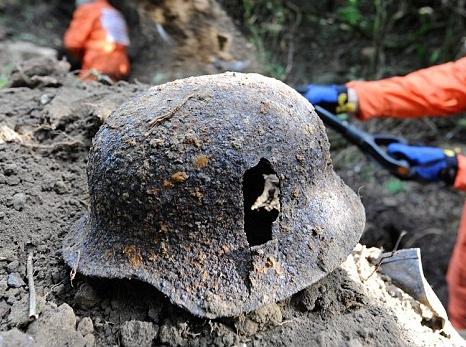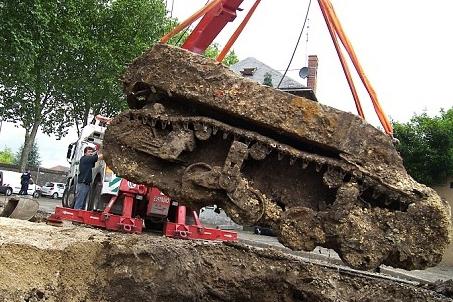Sixty-eight years ago, the Second World War ended. Excavations continue to this day.
What prompts local residents and archaeologists from afar to pick up a shovel, going to the places of past battles? In most cases, this, alas, is greed. Found artifacts - silent witnesses of someone's lives and deaths - in our pragmatic age have their market value. Excavations of World War II became an urgent business.
"Black" diggers are looking for everything that can be of material value. The most profitable are the remains of the invaders - primarily Germans, as well as Romanians, Italians, Spaniards, Hungarians and other representatives of the countries that participated in the war against the USSR. This is explained by the fact that sometimes amusing items of interest to collectors are found in their duffel bags.

What could a Soviet soldier have? Except for an asterisk on a cap, except, as the song says, “a letter from mother and a handful of native land”. The charter of the Red Army did not provide for death medallions, sometimes the soldiers themselves made them, but this was infrequent, it was considered a bad omen. Excavations of the Second World War in Ukraine, Russia and Belarus, unfortunately, rarely lead to the fact that the identity of the deceased is revealed, and if this happens, it is usually due to the preserved documents, letters and metal objects on which the owners scratched the name and surname. Often the remains are under a shallow layer of soil, literally in decimeters from the surface.
A special luck among diggers is the discovery of jewelry, including SS rings, Nazi decorations, belt buckles, buttons, cockades, knives with imperial eagles. Helmets, flasks and other ammunition go well at the auction.
Unofficial diggers in the nineties sometimes restored the “trunks” found in the land for sale to representatives of the criminal world. Today, this method of armament has lost its relevance, a modern gun or machine gun is cheaper.
Excavations of World War II are carried out by both “black” and “white” archaeologists. There are two main differences between them: firstly, the availability of documents confirming the right to search, secondly, goals. Formally established groups are looking for the remains of soldiers in order to report that one unknown soldier has become smaller. Things found in this case are transferred to relatives, in memory of the heroically deceased ancestor, with the exception, of course, of weapons.

Of particular interest in the historical aspect is military equipment, usually flooded. In the waters of the Odessa Gulf, not so long ago, divers discovered the three-engine transport "Junkers" - Yu-52. Among the things on board is a tablet with topographic maps, on which were laid plans for the retreat of the German troops. How the destruction of the headquarters aircraft affected the outcome of the liberation operation remains to be evaluated by historians. Other excavations of the Second World War are also important : tanks, planes, cars, ships. By the serial number stamped on the supporting structure, it is possible, using the archives of the Ministry of Defense, to determine who controlled this equipment.
The mass nature of the “missing” was the result of huge losses suffered by the warring parties on the territory of the USSR. However, excavations of World War II sometimes reveal unknown pages of history in North Africa, in Europe, and in other regions engulfed in the flames of those years. In 1998, French experts made a statement about the discovery of a light aircraft in the sea near Marseille, on which the famous writer Antoine de Saint-Exupery set off on his last flight.